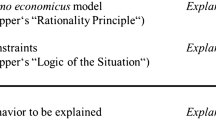Abstract
The study of ethical behavior is usually done in a static context, ignoring the lagging consequences of acts. A dynamic model of ethical behavior is developed in this paper, where it is shown that unless some religious beliefs or social considerations are taken into account by the individual, his/her actions will only become less ethical over time. The model elicits many other characteristics of ethical behavior, such as the role of selfesteem and reputation and the importance given to future consequences.
The idea of this paper has initially been discussed in 1998 with Tuomas Raivio and Gerald Karner at the Systems Analysis Laboratory of the Helsinki University of Technology (Finland). I wish to thank Tuomas Raivio and Georges Zaccour for their comments on the first draft. Although lowe much to them, the responsibility of any error remains mine.
Access this chapter
Tax calculation will be finalised at checkout
Purchases are for personal use only
Preview
Unable to display preview. Download preview PDF.
Similar content being viewed by others
References
Alexander, R.D. (1987).The Biology of Moral Systems. Hawthrone, Aldine De Gruyter.
Aristotle. (1955)Nicomachean Ethics. Harmondsworth, Penguin.
Bentham, J. (1789). “An Introduction to the Principles of Morals and Legislation” in Burns J. and Hart L. (eds) (1970). London, Athlone Press.
Kamien, M., and Schwartz, N.L. (1981).Dynamic Optimization: the Calculus of Variations and Optimal Control. Amsterdam, Elsevier Science Publishers.
Kant, I. (1788).Critique of Pratical Reason. Beck L.W. (ed.) (1949). Cambridge, Cambridge University Press.
Kurtines, W.M., and Gewirtz, J.L. (eds) (1984).Morality, Moral Behavior, and Moral Development. New York, Wiley.
Jones, T.M. (1991). “Ethical Decision Making by Individuals in Organizations: An Issue-Continent Model”.Academy of Mangement Review. Vol. 16 (2) 366–395.
Jorgensen, S., Sigué, S.P., and Zaccour, G. (2000). “Cooperative Advertising in a Dynamic Vertical Channel”.Journal of Retailing. Vol. 76(Winter) 71–92.
Léonard, D., and van Long, N. (1992).Optimal Control Theory and Static Optimization in Economics. Cambirdge, Cambridge University Press.
Lickona, T. (ed.) (1976).Moral Development and Behavior: Theory, Research, and Social Issues. New York, Holt, Rinehart and Winston.
Mill, J.S. (1863).Utilitarianism. Warnock M (ed.) (1962). London, Fontana.
Rinaldi, S. (1998). “Love Dynamics: The Case of Linear Couples”.Applied Mathematics and Computation. Vol. 95 181–192.
Rotemberg, J.J. (1994). “Human Relations in the Workplace”.Journal of Political Economy. Vol. 102 (4) 684–717.
Sengupta, J., and Fanchon, P. (1997).Control Theory Methods in Economics. Boston, Kluwer Academic Publishers.
Simpson, E.L. (1976). “A Holistic Approach to Moral Development and Behavior”. In Lickona (1976).
Tamari, M. (1996). “Determining the Criteria of Ethical Behavior”. In Gasparski, W.-W., Ryan, L.-V. (eds)Human action in business: Praxiological and ethical dimensions. Praxiology: The International Annual of Practical Philosophy and Methodology. Vol. 5, 197–211. New Brunswick, N.J. and London, Transaction.
Tri-Council Policy Statement (Medical Research, Natural Sciences and Engineering, and Social Sciences and Humanities Councils of Canada) (1998).Ethical Conduct for Research Involving Humans. Ottawa, Public Works and Government Services Canada.
Editor information
Editors and Affiliations
Rights and permissions
Copyright information
© 2002 Springer Science+Business Media New York
About this chapter
Cite this chapter
Pineau, PO. (2002). An Ethical Behavior Interpretation of Optimal Control. In: Zaccour, G. (eds) Optimal Control and Differential Games. Advances in Computational Management Science, vol 5. Springer, Boston, MA. https://doi.org/10.1007/978-1-4615-1047-5_4
Download citation
DOI: https://doi.org/10.1007/978-1-4615-1047-5_4
Publisher Name: Springer, Boston, MA
Print ISBN: 978-1-4613-5368-3
Online ISBN: 978-1-4615-1047-5
eBook Packages: Springer Book Archive




